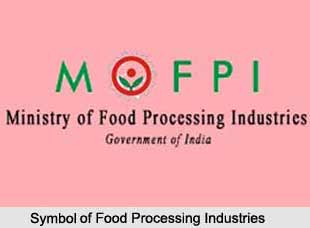 The Ministry of Food Processing Industries is the agency of the Government of India responsible for processed foods and is responsible for developing a strong and vibrant food processing sector. It mainly works towards stimulating the demand for appropriate processed foods, achieving maximum value addition and by-product utilization, creating increased job opportunities particularly in rural areas, enabling farmers to reap the benefits of modern technology, creating surpluses for exports.
The Ministry of Food Processing Industries is the agency of the Government of India responsible for processed foods and is responsible for developing a strong and vibrant food processing sector. It mainly works towards stimulating the demand for appropriate processed foods, achieving maximum value addition and by-product utilization, creating increased job opportunities particularly in rural areas, enabling farmers to reap the benefits of modern technology, creating surpluses for exports.
In the era of economic liberalization where the private, public and co-operative sectors are to play their rightful role in development of food processing sector, the Ministry acts as a catalyst for bringing in greater investment into this sector, guiding and helping the industry in a proper direction, encouraging exports and creating a conducive environment for the healthy growth of the food processing industry.
Objectives of Ministry of Food Processing Industries
Objectives of the food processing industries include the following:
Better utilization and value addition of agricultural produce for enhancement of income of farmers;
Minimizing wastage at all stages in the food processing chain by the development of infrastructure for storage, transportation and processing of agro-food produce;
Induction of modern technology into the food processing industries from both domestic and external sources;
Maximum utilization of agricultural residues and by-products of the primary agricultural produce as also of the processed industry;
To encourage Research and Development in food processing for product and process development and improved packaging;
To provide policy support, promotional initiatives and physical facilities to promote value added exports.
Functions of Ministry of Food Processing Industries
The strategic role and functions of the Ministry fall under three categories- Policy support developmental and promotional, Technical and advisory and Regulatory functions.
It is concerned with the formulation and implementation of policies and plans for all the industries under its domain within the overall national priorities and objectives. Its main focus areas include - development of infrastructure, technological up gradation, development of backward linkages, enforcement of quality standards and expanding domestic as well as export markets for processed food products. The Ministry acts as a catalyst and facilitator for attracting domestic and foreign investments towards developing large integrated processing capacities, by creating conducive policy environment, including rationalization of taxes and duties. It processes applications for foreign collaborations, Export Oriented Units (EOUs) etc. and assists/guides prospective entrepreneur in his endeavour.
Post liberalization, it has approved a large no. of joint ventures, foreign collaborations, industrial licenses and 100 percent EOU proposals in different food processing areas and has taken major policy initiatives to facilitate an accelerated growth of the industry.
Policy Support Functions
This includes formulation and implementation of policies for food processing industries within overall national priorities and objectives, facilitating the creation of a conducive policy environment for healthy growth of the food-processing sector, promoting rationalization of tariffs and duties relating to food processing sector.
Developmental Functions
As part of its developmental functions the ministry provides assistance under various plan schemes; helps widen the Research and Development (R&D) base in food processing by involvement of various R&D institutes and support to various R&D activities relating to development of product, process and packaging with special emphasis on traditional technologies; works towards human resource development both for entrepreneurs as well as workers engaged in the food processing industry by up gradation of their skills. It also provides assistance for setting up analytical and testing laboratories, active participation in the laying down of food standards as well as their harmonization with international standards.
Promotional Functions
The Ministry provides assistance for organization of workshops, seminars, exhibitions and fairs etc; helps in studies surveys publications and films etc.
Regulatory Functions
Its regulatory functions include the implementation of Fruit Products Order (FPO)






